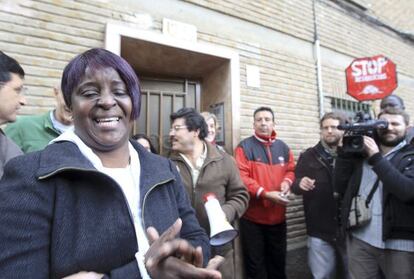Rebel mayors threaten banks that continue with eviction policy
Canarian city leader withdraws 1.2 million euros from Bankia over foreclosure row

As the eviction row rumbles on, a number of Spanish mayors are taking matters into their own hands when it comes to their citizens being thrown out onto the street for mortgage non-payment. City leaders across the country are warning they will close their accounts with banks that continue a policy of carrying out eviction orders without giving those affected an alternative.
The mayor of Santa Cruz de Tenerife, José Manuel Bermúdez of the Canarian Coalition, last Thursday became a hero across the island after he decided to withdraw 1.5 million euros from Bankia to prevent the eviction of Carmen Omaña, a 48-year-old mother of two.
“We tried to meet and look for a solution with the bank, but it didn’t reply,” Bermúdez explained. “We warned Bankia that there would be consequences, and Carmen Omaña began a hunger strike. After these events I ordered 1.5 million euros to be withdrawn from the bank, because we refuse to accept that banks that have been bailed out with the money of all citizens do not even deign to answer the administration.”
Now, other city leaders are following suit. The Socialist mayor of Vigo, Abel Caballero, has told EL PAÍS that he will not hesitate to take similar action, as well as creating initiatives to ease the extremely vulnerable situations in which many evicted citizens live.
The treasury department of the Galician city is preparing an amendment to its public tender conditions so that any bank executing an eviction order will face a contract termination lawsuit. “It cannot be that a person who has lost their job, and as a consequence cannot pay the mortgage on their home, is thrown out of that home, and, what’s more, still be in debt,” Caballero said.
In the majority of cases, the home from which a family has been expelled remains empty. “Instead of throwing people out of their home, it could allow them to pay rent at a decent price,” the mayor continued. He also plans to offer free legal advice by City Hall lawyers to those who have already been affected by eviction orders and will be conducting a draw for 35 rental homes especially for those who have been thrown out of their properties. Caballero has also told the Galicia regional government that Vigo local police “would not help carry out eviction orders.”
Meanwhile, the Socialist mayor of Zaragoza, Juan Alberto Belloch, on Monday said he would argue for a grand city-wide political and social pact against the problem, predicting a 10-million-euro package.
The movement among mayors looks like becoming unstoppable. City leaders will examine the adoption of specific anti-eviction measures at the next board meeting of the Spanish Federation of Municipalities and Provinces (FEMP), of which Caballero is vice-president, on November 27. FEMP President Íñigo de la Serna, the Popular Party mayor of Santander, has also shown his intentions of moving to the forefront of the fight.
Ultimately, says Bermúdez, change has to come via a reform of the mortgage law. But he admitted much could be done at the local council level. “We have set up an anti-eviction protocol that has been pioneered in Spain,” said the Santa Cruz mayor. “Thanks to this mechanism we can mediate between citizens and the banks, above all in cases in which local residents find themselves with no means of support. [...] What I would like is for this to serve to create a different policy.”
Tu suscripción se está usando en otro dispositivo
¿Quieres añadir otro usuario a tu suscripción?
Si continúas leyendo en este dispositivo, no se podrá leer en el otro.
FlechaTu suscripción se está usando en otro dispositivo y solo puedes acceder a EL PAÍS desde un dispositivo a la vez.
Si quieres compartir tu cuenta, cambia tu suscripción a la modalidad Premium, así podrás añadir otro usuario. Cada uno accederá con su propia cuenta de email, lo que os permitirá personalizar vuestra experiencia en EL PAÍS.
¿Tienes una suscripción de empresa? Accede aquí para contratar más cuentas.
En el caso de no saber quién está usando tu cuenta, te recomendamos cambiar tu contraseña aquí.
Si decides continuar compartiendo tu cuenta, este mensaje se mostrará en tu dispositivo y en el de la otra persona que está usando tu cuenta de forma indefinida, afectando a tu experiencia de lectura. Puedes consultar aquí los términos y condiciones de la suscripción digital.








































